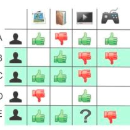Matrix factorization (MF) is a simple collaborative filtering technique that achieves superior recommendation accuracy by decomposing the user-item rating matrix into user and item latent matrices. This approach relies on learning from user-item interactions, which may not effectively capture the underlying shared dependencies between users or items. Therefore, there is scope to explicitly capture shared dependencies to further improve recommendation accuracy and the interpretability of learning results by summarizing user-item interactions. Based on these insights, we propose "Hierarchical Matrix Factorization" (HMF), which incorporates clustering concepts to capture the hierarchy, where leaf nodes and other nodes correspond to users/items and clusters, respectively. Central to our approach, called hierarchical embeddings, is the additional decomposition of the user and item latent matrices (embeddings) into probabilistic connection matrices, which link the hierarchy, and a root cluster latent matrix. Thus, each node is represented by the weighted average of the embeddings of its parent clusters. The embeddings are differentiable, allowing simultaneous learning of interactions and clustering using a single gradient descent method. Furthermore, the obtained cluster-specific interactions naturally summarize user-item interactions and provide interpretability. Experimental results on rating and ranking predictions demonstrated the competitiveness of HMF over vanilla and hierarchical MF methods, especially its robustness in sparse interactions. Additionally, it was confirmed that the clustering integration of HMF has the potential for faster learning convergence and mitigation of overfitting compared to MF, and also provides interpretability through a cluster-centered case study.
翻译:暂无翻译



